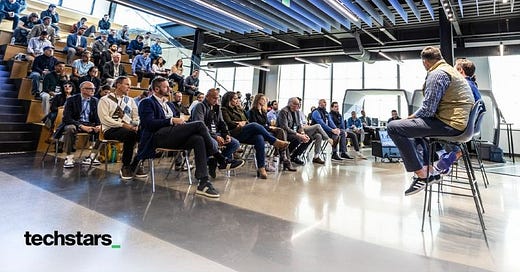From Biais to Balance: How Words Impacts Your Work
One of the perks to join as a Founding Member is that you get featured in this newsletter! Today, we welcome the founder of WriteByMe, an AI-powered text editor.
Bienvenue! I am Marion Siboni, CEO and founder of La Creme de la STEM™, the only global, private network for early-stage female founders in tech and science. Interested in joining the community? We have 9 spots left for Founding Members who want to benefit from exclusive benefits and join like-minded women entrepreneurs! Apply for membership before it is too late!
Twice a month, I share valuable insights about entrepreneurship, community building, and inspiring women's stories. 4,700+ investors, entrepreneurs, and operators have already subscribed. Join them!👇
✍️ Current setting ✍️
📍 Writing you from: Birdee, a new coffee shop in Domino Sugar
☕️ Drinking: a hot latte with regular milk
🎵 Listening to: Carre OK - Soolking and Gims
The Role of Language as a Carrier of Bias: Unraveling the Impact On Women in the Workplace
Language and communication play a crucial role in shaping our perceptions and interactions within the workplace. We may feel competent and capable and informed when we communicate, but is this how we are being understood? It is important to acknowledge that language itself can be a carrier of hidden biases, particularly when it comes to gender. Closing the gender gap in written communication requires us to examine how women talk and write, and how their voices may be influenced or marginalized within power dynamics.
Linguistics research has shown that language can reinforce stereotypes and perpetuate unequal power dynamics. For instance, certain words or phrases may inadvertently convey gender bias or reinforce traditional gender roles. This can have a profound impact on how women are perceived and valued in professional settings. To address this issue, it is essential for individuals and organizations to actively challenge these biases in their own communication practices. Recognizing the hidden biases embedded in language and communication is vital, both for closing the gender gap in the workplace and for allowing businesses to hire and promote the best candidates.
Language, Power, and Representation in Leadership / Understanding Language Bias
Unconscious beliefs regarding gender and perceptions of power (and power dynamics) can have a major impact on how women in business and leadership positions are perceived. Even in seemingly innocuous ways, language can reinforce biased perceptions about women’s competence. For instance, studies have shown that the linguistic subtleties of language, such as using diminutives or addressing women by their first names while using titles for men, can undermine women’s authority and position them as less competent or lower in status. Women often face a double-bind situation when it comes to assertiveness. Assertive language, which is often seen as necessary for leadership and authority, is often penalized when it comes from women. They may be labeled as “bossy” or “aggressive.” On the other hand, women are also expected to be polite and accommodating, which can lead to their ideas being dismissed or undervalued. Similarly, agentic language, which emphasizes assertiveness and control, is often associated with male leaders, while communal language, which emphasizes empathy and collaboration, is often associated with female leaders. Hedging is another language habit in which women tend to engage more than men. Hedging involves using tentative language, downplaying one’s expertise, or apologizing excessively. While it may be an attempt to appear modest or avoid confrontation, it can undermine women’s confidence and credibility.
Challenging Societal Norms and Gendered Expectations
Throughout history, societal “norms” and gendered expectations have influenced the development of language, leading to linguistic patterns that favor men and marginalize women. In order to be heard and respected, women often find themselves compelled to adhere to male-dominated communication styles. This places an additional burden on women, as they are forced to adapt to a communication framework that may not align with their natural inclinations. Such conformity can stifle their authentic voice, limiting their ability to express ideas and contribute effectively.
A natural starting point for any discussion of language, power, and gender is linguist Robin Lakoff’s proposition that men’s and women’s speech differ substantially, and that these differences reflect women’s powerlessness in society. It is suggested that lexical hedges, tag questions, rising intonation, empty adjectives, intensifiers, and super-polite forms constitute some of the differences. The workplace is no exception to these language dynamics.
The implications of unconscious gender bias range from subtle to severe.
🚀About WriteByMe
At WriteByMe™, we believe in the power of language to shape perceptions and empower communication, and we are committed to empowering our users to communicate more effectively, in his or her authentic voice.
Combining extensive research on communication, gender, and leadership, WriteByMe™ is an innovative GenAI-powered text editor that identifies ineffective words and phrases and highlights them, along with an explanation of the word category and how these words can undermine your competency, capability, and authority, then provides suggestions for word/phrase replacement. WriteByMe is always the author’s voice, now empowered.
Contact them to discuss how WriteByMe can benefit you, your business, and your employees.: Karen@WriteByMe.io
To see WriteByMe in action, please visit www.WriteByMe.io
🚨 Entrepreneurs Alert 🚨
Applications for Techstars Fall 2025 programs are open! Techstars is introducing an improved accelerator investment offer for companies accepted into our future accelerator programs. This improved offer of a $220,000 investment comes with all the benefits of the 3-month mentorship-driven accelerator program, valuable perks from our partners, and access to our world-class network of investors, partners, mentors, and alumni.
Don’t wait, apply by June 11th to secure your spot!
🔗 Community Building Thoughts 🔗
Healthcare VCs and entrepreneurs, mark your calendar for April 17th! We already have a waitlist, but we saved a few seats for founders and investors in healthcare.
The evening will feature a distinguished lineup of speakers, including Elena Piskounova, Founder of OnixBio; NanaYaa Mensah-Thomas, MBA, CLT, Managing Partner and Founder of Purelite Ventures; Denali Dahl, PhD, CEO/Co-Founder of Kalia Health; and Silvia Garcia Codony, Associate Vice President at New York Ventures. Together, they will share their expertise on how innovation and investment are driving progress in women’s healthcare.
Join us for an inspiring evening that promises to spark innovation and collaboration in this rapidly evolving field! Register HERE.
✨ Inspiring Women’s Stories ✨
When I attended SXSW a few weeks ago, I had the opportunity to attend panels at the Inc. Founder House. I spent my entire Saturday there, listening to incredible entrepreneurs, community builders and investors. But what striked me the most is the interview of Misty Copeland, a baller dancer, author, and producer.
Misty Copeland is a legend. In 2015, she became the first Black woman to become a principal ballerina for the American Ballet Theater in its 75-year history. She shared her story with honesty and vulnerability. She emphasized the importance of having your own voice, while owning the narrative. She insisted on how being the only one in the room is your superpower, and the importance of embracing it. A true symbol of resilience, she even mentioned that giving birth was nothing compared to the Swan Lake choreography!
Beyond dancing, Copeland has found success as a businesswoman, advocate, founder of Life in Motion Productions, New York Times Bestselling author, and founder of The Misty Copeland Foundation. She also has worked with brands ranging from Oikos to Under Armour and Coach to Mattel.
That’s it for today! If you want to keep up with my content on other channels, join 9,700 followers who read my posts on LinkedIn and don’t forget to give some love (aka likes) to the company page! Your support means a lot to me, thank you!







